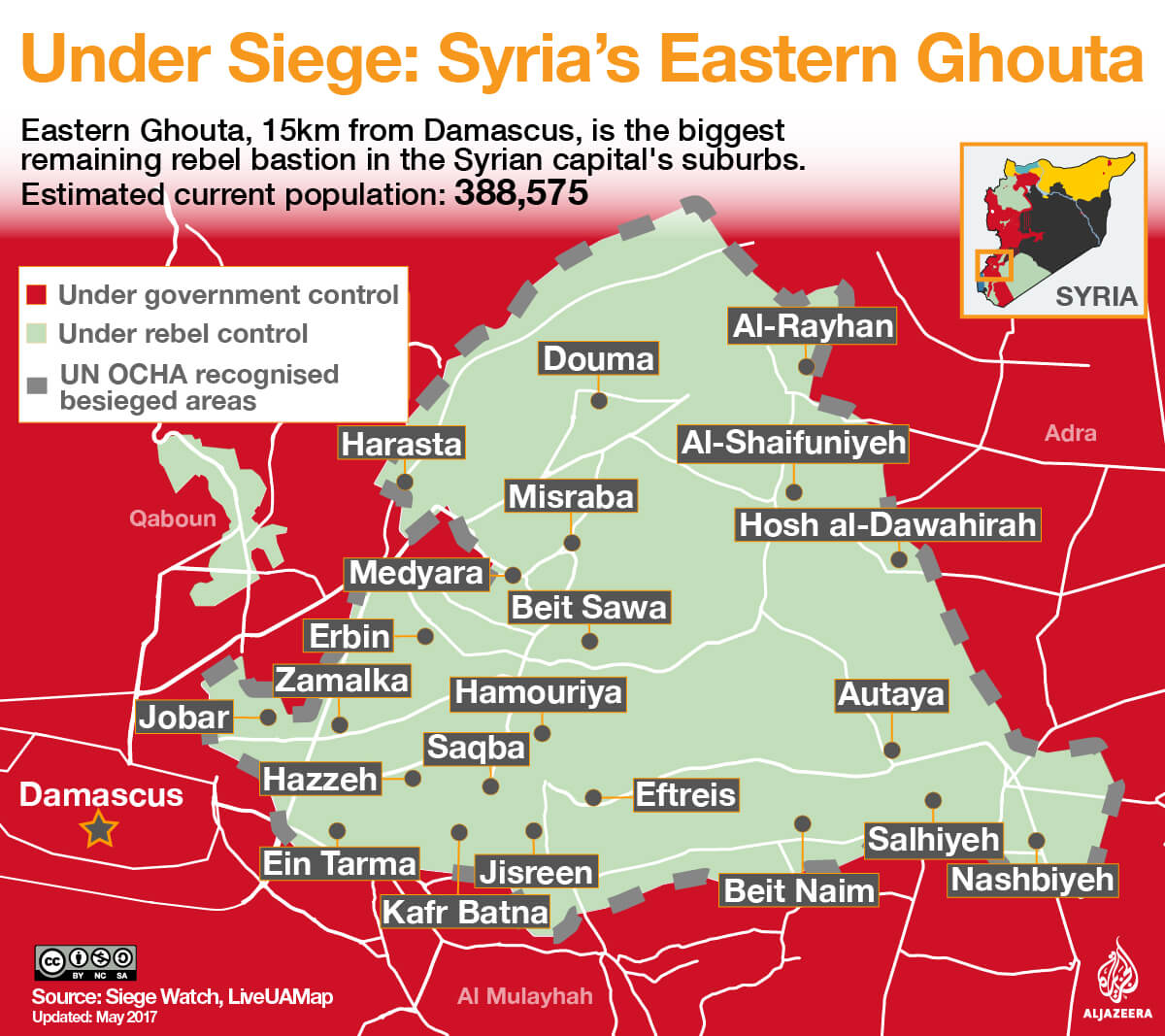Besieged Eastern Ghouta near Damascus is one of the last strongholds of rebels fighting Bashar al-Assad’s forces.

A new deal designating a de-escalation zone in the Syrian province of Eastern Ghouta has been signed with Syrian rebels, the Russian Ministry of Defence said on Saturday.
The de-escalation agreement was signed with Egyptian mediation after representatives of Syrian opposition groups and the Russian military held talks in Cairo.
The agreement provides for a ceasefire in the zone, allowing food and humanitarian aid to be brought in and the ill and wounded to be evacuated for treatment elsewhere, according to the Russian Ministry of Defence.
With many of its towns and villages ravaged by bombardments in the six-year conflict, Eastern Ghouta near Damascus is one of the last strongholds of rebels fighting President Bashar al-Assad’s forces and was the scene of a chemical weapon attack that killed hundreds in August 2013.
IN PHOTOS: How life goes on in a besieged town
The Syrian armed forces also announced halting hostile activities “in several areas in Eastern Ghouta,” starting Saturday.
In a statement published by Syria’s state-run press agency, the Syrian army said that “an agreement of cessation of hostilities takes effect as of noon [09:00 GMT] on Saturday.”
It also warned that any breaches to the agreement “will be properly responded to”.
The Russian military explained that “the documents fix borders of the de-escalation zone, locations and authorities of the forces observing the de-escalation, as well as routes for delivery of humanitarian aid and for free movement of the civilians,” as cited by Russian press agency TASS.
It added that the first humanitarian aid convoy is due in the coming days, as well as convoys to evacuate the injured.
Al Jazeera’s Mohammed Jamjoom, reporting from the Turkish city of Kilis close to the Syrian border, said that several rebel factions fighting inside Ghouta had confirmed the cessation of hostilities but had not signed any deal.
“In essence, this was sort of a surprise to them that this happened today,” he said.
“Nonetheless, they tell us that they are certainly welcoming of this – that this is a long time in coming, and that they do hope that the Russian government will press on Syria and the Syrian military to ensure that this cessation of hostilities actually keeps going.”
READ MORE: Syria’s civil war explained from the beginning
The London-based Syrian Observatory for Human Rights deemed the situation in Ghouta to be largely “calm” since the announcement of the agreement.
However, the watchdog accused the Syrian government of breaching the deal twice since it took effect.
According to the Observatory’s report, government tanks shelled a village inside Ghouta, leaving material damage but no casualties.
One of four ‘de-escalation zones’
Eastern Ghouta is in one of four proposed “de-escalation zones” designated in a deal reached by government allies Iran and Russia and rebel backer Turkey in May.
The accord specified four initial areas: Idlib in the north, Homs in the east, Eastern Ghouta and southern Syria.
Regions controlled by Hayat Tahrir al-Sham, an al-Qaeda-linked alliance, are exempt from the deal.
But the accord has yet to be fully implemented over disagreements on policing the safe zones, and Eastern Ghouta is just the second zone to see a ceasefire come into force.
 |
More than 2.5 million people are believed to live in the four zones.
The May accord roughly laid out the areas where rebels and government forces should halt hostilities, including air strikes, for six months.
However, Russia, Turkey and Iran failed to meet a June 4 deadline to set exact boundaries for the zones.
One major stumbling block appeared to be who would ensure security in all four areas, with Turkey and Iran in particular reportedly wrangling to bolster their influence.
OPINION: Syria and the case for editorial accountability
A new meeting in the Kazakh capital Astana is expected during the last week of August, with rebels as well as representatives from Turkey and Iran to attend, Russia has said.
Following a meeting between US President Donald Trump and his Russian counterpart Vladimir Putin on the sidelines of the G20 meeting in Hamburg early July, a ceasefire agreement was declared in
south-western Syria. It affected the provinces of Suweida, Deraa and Quneitra.
More than 330,000 people have been killed in Syria since its conflict broke out in March 2011 with anti-government protests.
Source: Al Jazeera and news agencies






